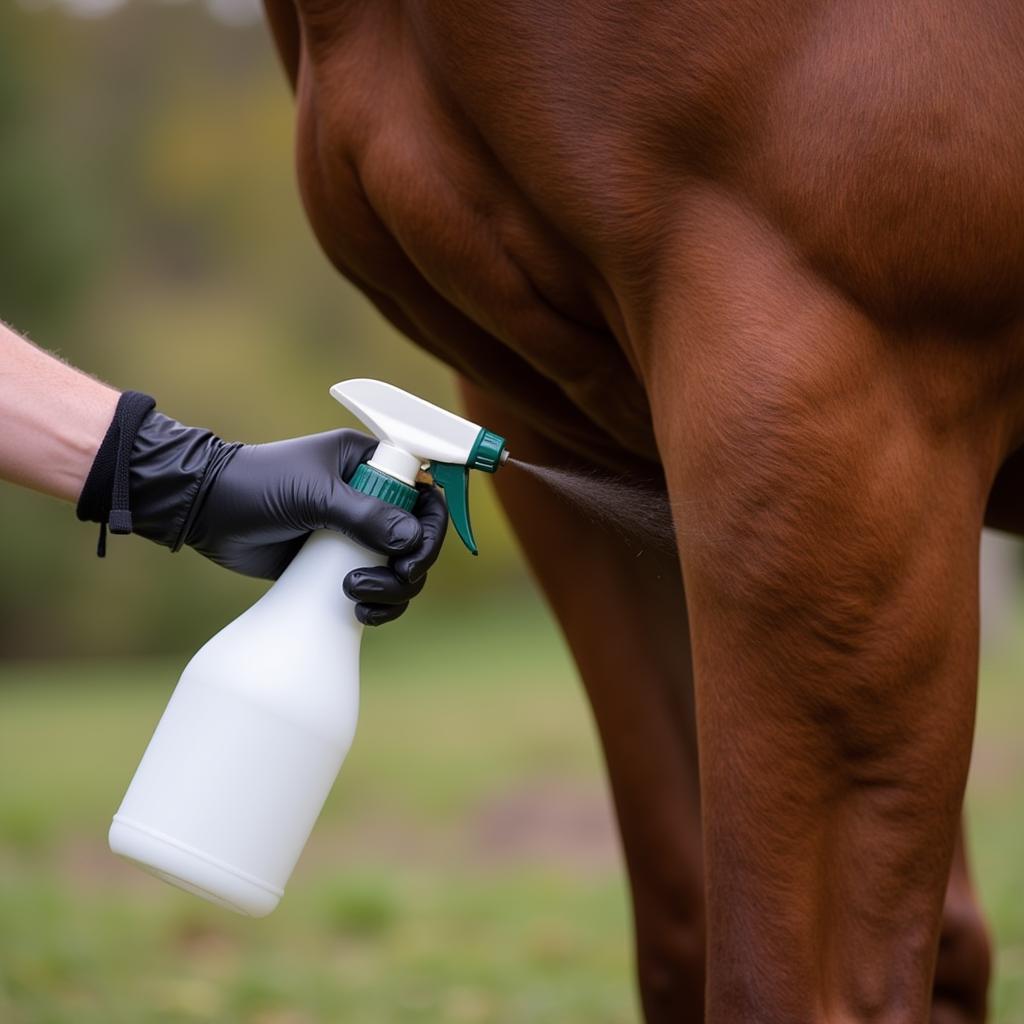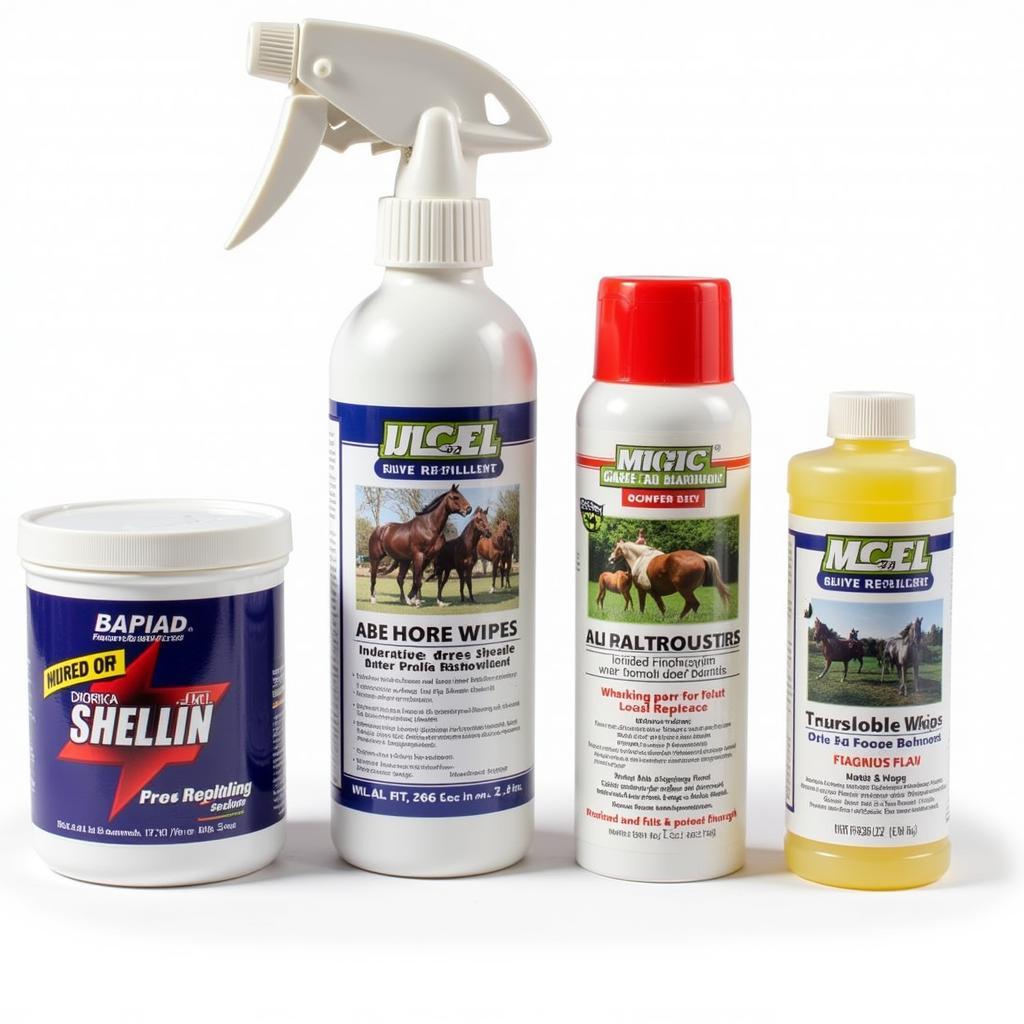Flies are more than just a nuisance for horses; they can transmit diseases, cause irritation, and impact your horse’s overall well-being. Choosing the right Fly Repellent For Horses is crucial for protecting your equine companion during the warmer months. This comprehensive guide will help you navigate the world of fly repellents, ensuring your horse stays comfortable and pest-free.
Understanding the Need for Fly Repellent for Horses
Fly bites can lead to skin infections, allergic reactions, and even transmit dangerous diseases like West Nile Virus and Equine Infectious Anemia. Horses are particularly susceptible to fly bites around their sensitive eyes, ears, and muzzles. A quality fly repellent for horses is an essential part of responsible horse ownership, providing a protective barrier against these irritating and potentially harmful pests. Don’t underestimate the importance of incorporating fly repellent into your horse’s daily care routine.
 Applying Fly Repellent to a Horse
Applying Fly Repellent to a Horse
Types of Fly Repellent for Horses
There’s a wide variety of fly repellents available, each with its own pros and cons. Common types include sprays, roll-ons, wipes, and even feed-through supplements. roll on fly repellent for horses offer a more targeted application, while fly repellent wipes for horses are convenient for quick touch-ups. Understanding the differences between these options will help you choose the most effective fly repellent for your horse’s needs.
Choosing the Right Fly Repellent: Key Considerations
Several factors influence the effectiveness of a fly repellent. Consider the active ingredients, the duration of protection, and your horse’s individual sensitivities. Some horses may have sensitive skin and require a gentler formula. Additionally, the local climate and the prevalence of specific fly species in your area can impact your choice.
 Various Fly Repellent Options for Horses
Various Fly Repellent Options for Horses
Natural vs. Chemical Fly Repellents
Many horse owners prefer natural fly repellents, such as citronella horse fly spray, due to concerns about potential side effects from chemical ingredients. While natural options can be effective, they often require more frequent application. Chemical repellents, like fly and mosquito repellent for horses, typically offer longer-lasting protection but should be used with caution, following the manufacturer’s instructions precisely.
How to Apply Fly Repellent for Horses Effectively
Proper application is crucial for optimal protection. Always follow the product instructions carefully. For sprays, apply a light, even coating to all exposed areas of your horse’s body, avoiding the eyes and mucous membranes. For roll-ons, apply directly to the affected areas. Reapply as needed, especially after sweating or rain.
Preventing Fly Infestations in Your Barn
Managing flies in your horse’s environment is just as important as using fly repellent. Regularly cleaning stalls, removing manure, and maintaining good ventilation can significantly reduce fly populations. Consider using fly traps, fans, and other fly control methods to create a more comfortable and pest-free environment for your horse.
Expert Insights on Fly Control
“Integrated pest management is the key to effective fly control,” says Dr. Emily Carter, DVM, a leading equine veterinarian. “Combining fly repellents with environmental management strategies provides the best protection for your horse.” Another expert, renowned horse trainer Sarah Johnson, adds, “Don’t forget the importance of observation. Pay attention to your horse’s behavior and adjust your fly control strategy as needed.”
Fly Repellent for Horses: Your Key to a Comfortable Summer
Protecting your horse from flies is essential for their health and well-being. By understanding the various types of fly repellents available and implementing a comprehensive fly control strategy, you can ensure your horse enjoys a comfortable and pest-free summer. Remember to choose the right horse fly repellent spray based on your horse’s individual needs and environmental conditions.
FAQ
- How often should I apply fly repellent to my horse?
- What are the signs of a fly bite allergy in horses?
- Are natural fly repellents as effective as chemical ones?
- Can I use human insect repellent on my horse?
- What should I do if my horse ingests fly repellent?
- How can I prevent flies from breeding in my barn?
- What are the best fly control methods for pastures?
When you need assistance, please contact us: Phone: 0772127271, Email: [email protected] or visit us at QGM2+WX2, Vị Trung, Vị Thuỷ, Hậu Giang, Việt Nam. We have a 24/7 customer service team.